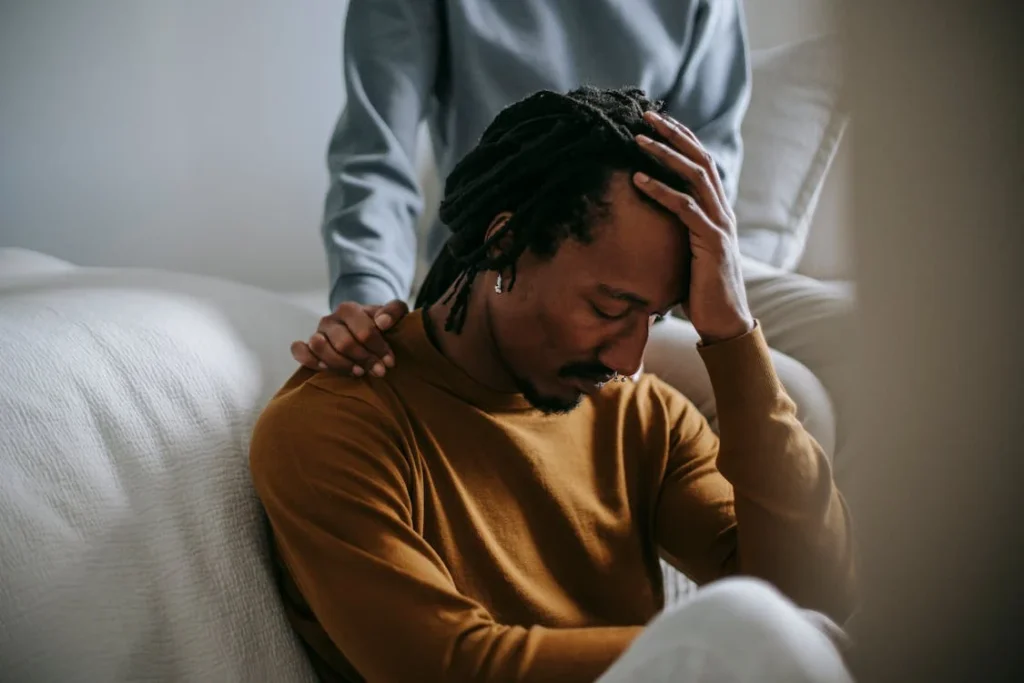Losing a limb is not just a physical challenge—it deeply affects emotions, self-image, and confidence. Many amputees struggle with social anxiety after amputation, feeling self-conscious in public or hesitant to engage with others. The fear of being stared at, judged, or treated differently can make social situations overwhelming.
This anxiety is completely normal. The body has changed, and adjusting to this new reality takes time. But avoiding people and isolating oneself can make recovery harder. Rebuilding confidence and learning to interact comfortably again is a crucial part of healing.

Understanding Social Anxiety After Amputation
Social anxiety after amputation is more than just nervousness about being around people. It is a deep fear of judgment, rejection, or standing out in a way that feels uncomfortable.
Many amputees feel as though others see only their missing limb and not the person they truly are. This can lead to avoidance of social situations, reluctance to leave home, and even feelings of isolation or depression.
One of the biggest triggers of social anxiety is the fear of unwanted attention. People may stare, ask questions, or make comments—sometimes out of curiosity, sometimes out of ignorance.
Even when these interactions are not meant to be hurtful, they can make an amputee feel exposed or different. The thought of explaining their amputation repeatedly or dealing with pity from others can become overwhelming.
Beyond public interactions, amputees may also struggle with anxiety in personal relationships. Friends, family, and colleagues may treat them differently, sometimes being overly cautious or assuming they are incapable of doing things on their own.
This shift in behavior can create frustration and self-doubt. It is not just about adjusting to physical changes but also about managing how others react to those changes.
The Emotional Impact of Social Anxiety
Social anxiety does not just affect a person’s ability to interact with others; it also takes a toll on emotional well-being. Amputees who withdraw from social activities often experience loneliness, sadness, and a sense of disconnection.
The more they avoid people, the harder it becomes to break out of this cycle.
Confidence is another major challenge. Before the amputation, daily interactions felt natural and effortless. Afterward, every conversation and public appearance can feel like a test.
Thoughts like “What if people stare?” or “What if I embarrass myself?” become common, making simple activities like going to a store or meeting a friend feel overwhelming.
Over time, these feelings can lead to negative self-perception. Instead of seeing themselves as strong individuals adapting to a new reality, amputees may begin to feel defined by their limb loss. This can make it difficult to accept support from others or seek help when needed.
The First Steps to Overcoming Social Anxiety
The journey to regaining confidence in social settings starts with acceptance. Coming to terms with amputation is not easy, and it is natural to feel self-conscious at first.
But recognizing that these feelings are temporary and that they can be managed is the first step toward overcoming them.
Small, gradual exposure to social situations can help rebuild confidence. Instead of avoiding public places altogether, starting with small outings—like visiting a familiar café or taking a walk in a quiet park—can make a big difference.
Each positive experience reinforces the idea that being in public is not as frightening as it may seem.
It is also important to change the way one thinks about social interactions. Instead of assuming that every stare or comment is negative, it helps to consider that many people are simply curious or unaware.
In many cases, people do not mean to be rude; they just do not know how to react.
Learning how to respond to questions with confidence and ease can turn uncomfortable moments into opportunities for connection and education.

Rebuilding Confidence and Facing the World Again
Overcoming social anxiety after amputation is not about avoiding people or hiding differences. It is about rebuilding confidence, embracing change, and stepping back into life with self-assurance.
The process takes time, but with patience and practice, it is possible to feel comfortable in social settings again.
Developing a Positive Self-Image
The way an amputee views themselves plays a major role in how they interact with others. If they feel insecure or ashamed of their limb loss, this insecurity will show in their posture, facial expressions, and behavior.
On the other hand, if they embrace their new reality and carry themselves with confidence, people will respond more positively.
One of the most effective ways to build a strong self-image is to focus on strengths rather than perceived limitations.
Instead of dwelling on what has changed, it helps to recognize all the things that remain the same—personality, intelligence, sense of humor, and skills. Amputation does not define a person; it is just one part of their story.
Wearing a prosthetic can also boost confidence. A well-fitted prosthetic, like those designed by Robobionics, allows for greater independence and ease of movement, reducing self-consciousness.
Many modern prosthetics are sleek, functional, and even stylish, making them feel like an extension of the body rather than a reminder of limb loss.
For those who choose not to wear a prosthetic, practicing how to move comfortably without one can also help create a sense of self-assurance.
Handling Unwanted Attention
One of the biggest concerns for amputees with social anxiety is how to deal with stares, questions, or comments from strangers. These situations can feel uncomfortable, but preparing for them in advance makes them easier to handle.
A common fear is that people will stare. The reality is, they probably will—at least at first. Humans are naturally curious, and when they see something different, they tend to look. This does not always mean judgment or negativity. In many cases, people are just trying to understand.
A helpful approach is to maintain eye contact, smile, and carry on as usual. Most people will look away once they realize their staring is noticed. If someone asks about the amputation, having a simple, prepared response can make the conversation smoother.
It can be as short as, “I had an accident and lost my leg, but I’m doing great now,” or as detailed as the amputee feels comfortable sharing. The key is to respond with confidence rather than discomfort.
In cases where people make insensitive or rude comments, the best response is often to stay calm and not engage emotionally. Ignoring negativity or redirecting the conversation to something positive helps prevent unnecessary stress.
Over time, dealing with these situations becomes easier, and the fear of public interactions fades.
Strengthening Social Connections
Reconnecting with friends, family, and the community is an essential part of overcoming social anxiety. The more time spent around supportive people, the easier it becomes to feel comfortable in social settings.
Close friends and family play an important role in this process. Having open conversations about feelings, concerns, and fears helps loved ones understand how to provide the right kind of support.
Some people may unintentionally treat the amputee differently, not out of pity, but out of uncertainty about what to say or do. Honest discussions can help set the right tone and maintain strong, equal relationships.
Joining support groups for amputees can also be incredibly helpful. Talking to others who have been through the same experience provides reassurance and motivation.
Seeing someone who has successfully adjusted to life after amputation can inspire confidence and show that social anxiety does not have to last forever.
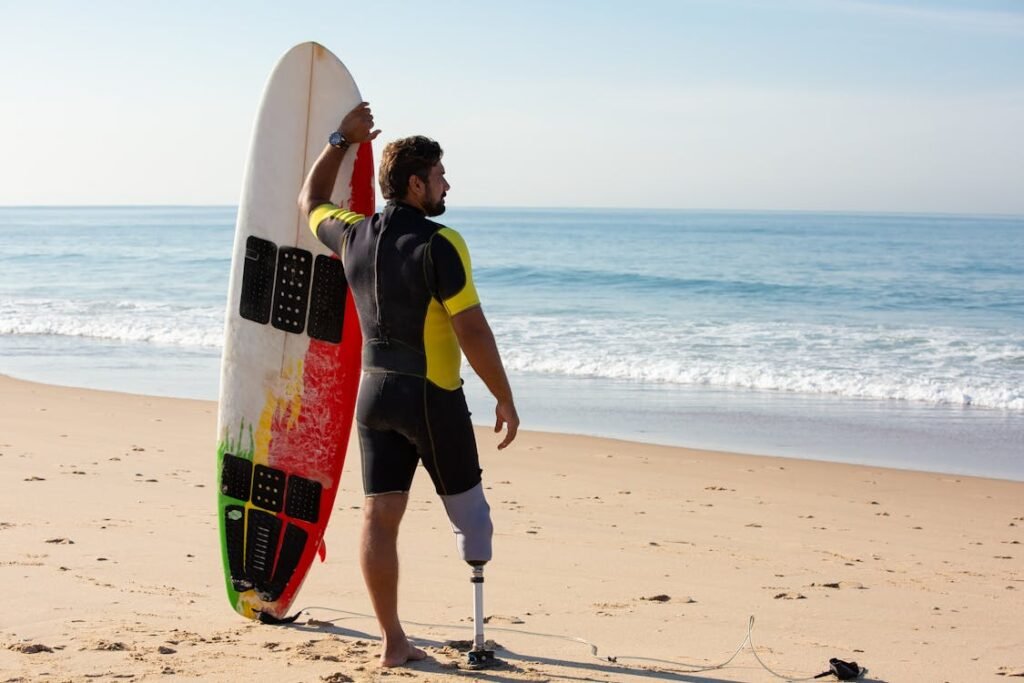
Embracing New Experiences and Moving Forward
Overcoming social anxiety is not just about managing everyday interactions—it is about reclaiming life, embracing new experiences, and realizing that amputation does not limit personal growth.
Many amputees initially hesitate to step outside their comfort zones, fearing that they will not be able to enjoy life the way they once did. However, facing these fears and gradually reintegrating into social and professional environments can lead to a fulfilling, empowered life.
Returning to Work and Public Life
One of the biggest milestones in post-amputation recovery is returning to work or engaging in community activities. Many amputees worry about how colleagues, clients, or acquaintances will react to their new reality.
They may fear being treated differently, doubted for their abilities, or placed under unnecessary scrutiny.
The key to a smooth transition is preparation. Practicing answers to common questions, setting personal boundaries, and focusing on strengths rather than limitations help make professional interactions more comfortable.
Colleagues will take cues from how the amputee presents themselves. If they project confidence and capability, others will respond with respect and acceptance.
For those who are not returning to a previous job but seeking new opportunities, exploring career paths that align with personal skills and interests can be an exciting way to regain independence.
Many workplaces are inclusive and accommodating, recognizing that a person’s abilities go far beyond their physical condition. Taking proactive steps, such as discussing workplace adjustments or prosthetic needs, ensures a smooth transition back into the workforce.
Engaging in Social Activities and Hobbies
Rebuilding a social life is just as important as reintegrating into work. Socializing does not have to be overwhelming—it can start with small gatherings, casual outings, or participating in a shared hobby.
Whether it is joining a book club, going to a movie with friends, or engaging in adaptive sports, these experiences help normalize social interactions and reduce anxiety.
Physical activities can be particularly empowering. Sports such as swimming, cycling, or running with a prosthetic leg not only improve physical health but also boost confidence.
Many amputees discover new hobbies they never considered before, finding joy in activities that challenge and inspire them. Adaptive sports programs and fitness groups offer supportive environments where individuals can connect with others who understand their journey.
Changing the Narrative from Limitation to Strength
One of the most powerful ways to overcome social anxiety is by changing the way amputation is perceived—not just by others, but by the amputee themselves.
Instead of seeing limb loss as something that makes them different in a negative way, it can be reframed as a testament to resilience, survival, and strength.
Many amputees who successfully reintegrate into social life find that their experience allows them to inspire others.
Whether through mentoring, speaking about their journey, or simply leading by example, they show that life after amputation is not about limitations—it is about adaptation, growth, and new possibilities.
At Robobionics, we believe that confidence is just as important as mobility. Our prosthetic solutions are designed to restore independence, but true recovery goes beyond the physical.
It is about embracing life with courage, reconnecting with the world, and proving—most importantly to oneself—that amputation does not define a person.
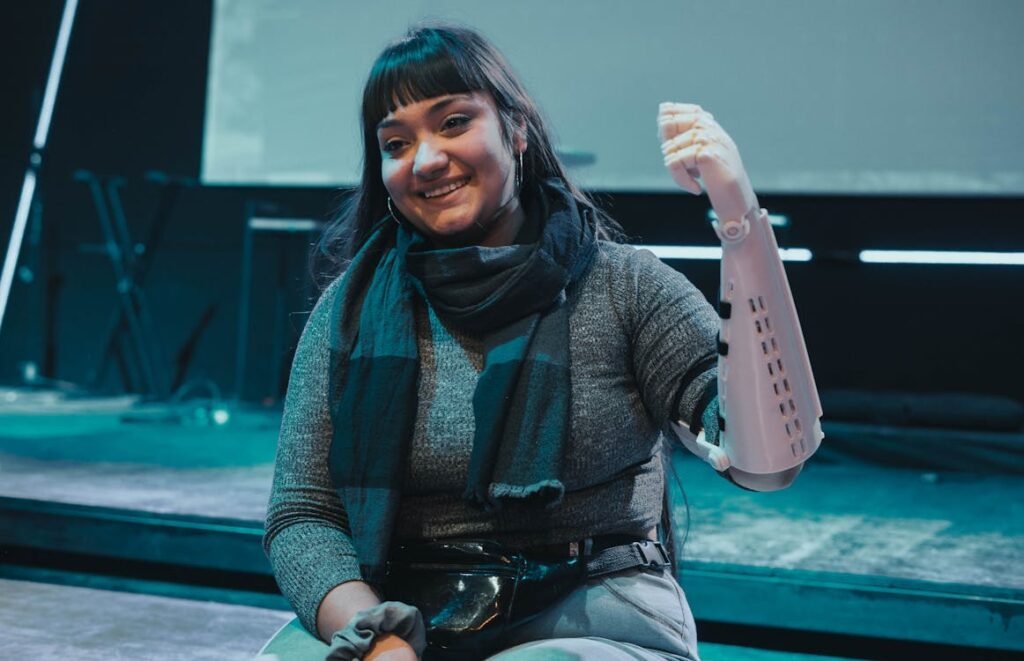
The Role of Mindset in Overcoming Social Anxiety
Recovering from an amputation is as much a mental journey as it is a physical one. The way an amputee thinks about their situation shapes how they respond to social challenges.
A strong, positive mindset does not eliminate anxiety overnight, but it creates the foundation for long-term confidence and self-acceptance.
Shifting Focus from Fear to Growth
Social anxiety thrives on fear—fear of judgment, embarrassment, or rejection. But fear is often based on assumptions rather than reality.
Many amputees assume that others will stare, pity them, or make insensitive remarks, and while these situations do happen, they are not as frequent as they might seem.
Instead of focusing on the worst possible outcomes, shifting perspective toward personal growth and resilience helps reduce anxiety.
Viewing social interactions as opportunities to regain confidence rather than as obstacles can make a big difference.
Each time an amputee steps outside, engages with someone, or completes a task independently, they are reinforcing the belief that they are more than their amputation. Over time, these small moments build a sense of normalcy and reduce fear.
Practicing Self-Compassion
Many amputees are their own harshest critics. They may feel frustration about needing help, embarrassment about their appearance, or disappointment over their physical limitations.
But self-criticism only deepens anxiety and makes social reintegration harder. Practicing self-compassion—treating oneself with the same kindness and patience as a friend—can change this.
It helps to acknowledge that healing takes time and that struggling with social anxiety does not mean failure. Every step forward, no matter how small, is progress.
Reminding oneself that adjusting to a new body and new experiences is a journey rather than a race helps reduce pressure and allows for a more gentle, accepting approach to recovery.

The Power of Communication and Self-Expression
One of the biggest fears associated with social anxiety is not knowing how to respond when someone asks about the amputation.
Many amputees struggle with how much to share, how to set boundaries, and how to deal with reactions from others. Learning effective communication strategies can ease these fears and make interactions feel more natural.
Choosing How to Share the Story
Every amputee has a different comfort level when it comes to discussing their amputation. Some may feel open about sharing their story, while others prefer to keep it private. There is no right or wrong way—it is entirely up to the individual.
A simple, prepared response can help reduce anxiety in social situations. It can be as straightforward as, “I lost my leg in an accident, but I’m doing well now,” or as detailed as the person feels comfortable sharing.
Having a go-to answer prevents hesitation and makes conversations feel more in control.
At the same time, it is important to remember that personal experiences do not have to be explained to everyone. If someone asks a question that feels too intrusive, a polite but firm response like, “I’d rather not talk about that,” is completely valid.
Setting boundaries is a key part of rebuilding social confidence.
Expressing Personality Beyond the Amputation
One of the biggest fears many amputees have is being defined by their limb loss. They worry that others will only see the amputation rather than the person they are. However, self-expression is a powerful way to shift this focus.
Clothing choices, accessories, and even prosthetic covers can be used to reflect personality and style.
Some amputees choose to embrace their prosthetic with custom designs or bold colors, turning it into a statement rather than something to hide. Others prefer a more subtle look that blends in. The important thing is feeling comfortable and authentic.
Beyond appearance, engaging in conversations about personal interests, hobbies, or experiences helps reinforce identity.
Whether it is a love for music, sports, art, or travel, showing enthusiasm for life outside of amputation naturally shifts the conversation toward individuality rather than physical differences.
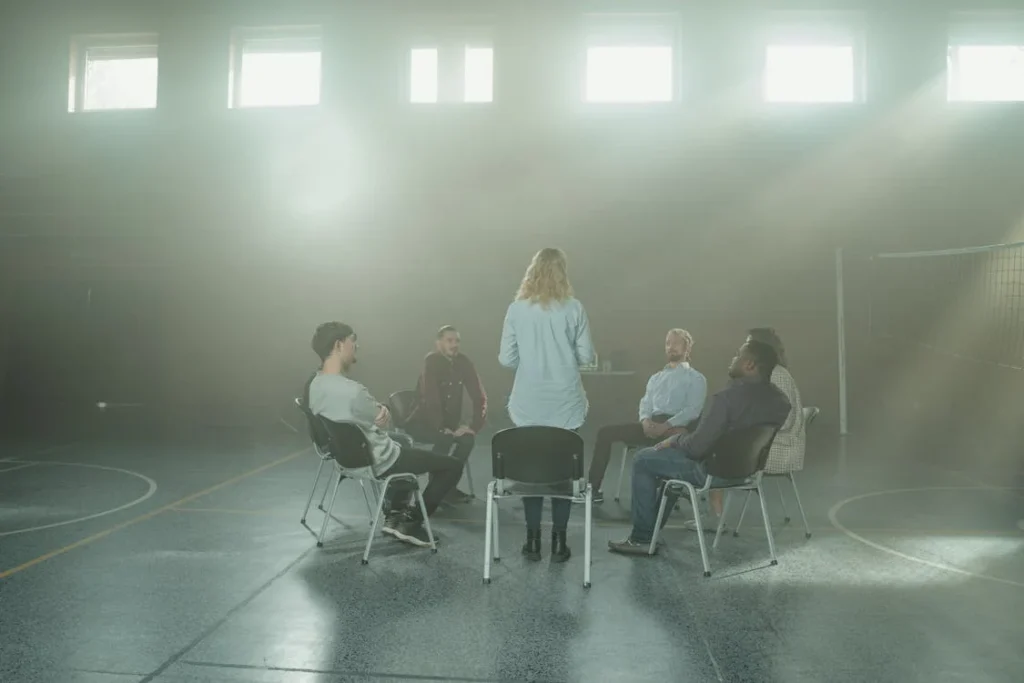
Finding Strength in Community and Shared Experiences
No one should have to face social anxiety alone. Connecting with others who have been through similar experiences can provide encouragement, reassurance, and practical advice.
Many amputees find that sharing their struggles and victories with a supportive community makes their journey easier.
Joining Support Groups and Online Communities
There are many support groups, both in-person and online, where amputees can talk openly about their experiences.
These communities provide a safe space to share fears, ask questions, and receive advice from those who truly understand. Sometimes, just knowing that others have faced the same challenges and overcome them can be incredibly motivating.
Online platforms allow for connection beyond local communities. Amputees from all over the world share their stories, challenges, and successes, offering valuable insights and emotional support.
Being part of a group that encourages growth and positivity can make a huge difference in overcoming social anxiety.
Learning from Role Models
Seeing other amputees thrive in different areas of life—whether it is in sports, arts, public speaking, or everyday activities—can inspire confidence. Many people who have gone through similar journeys use their experiences to uplift and guide others.
Seeking out these stories through social media, books, or documentaries can help reshape perceptions about life after amputation. When an amputee sees someone else living fully and confidently, it reinforces the belief that they can do the same.
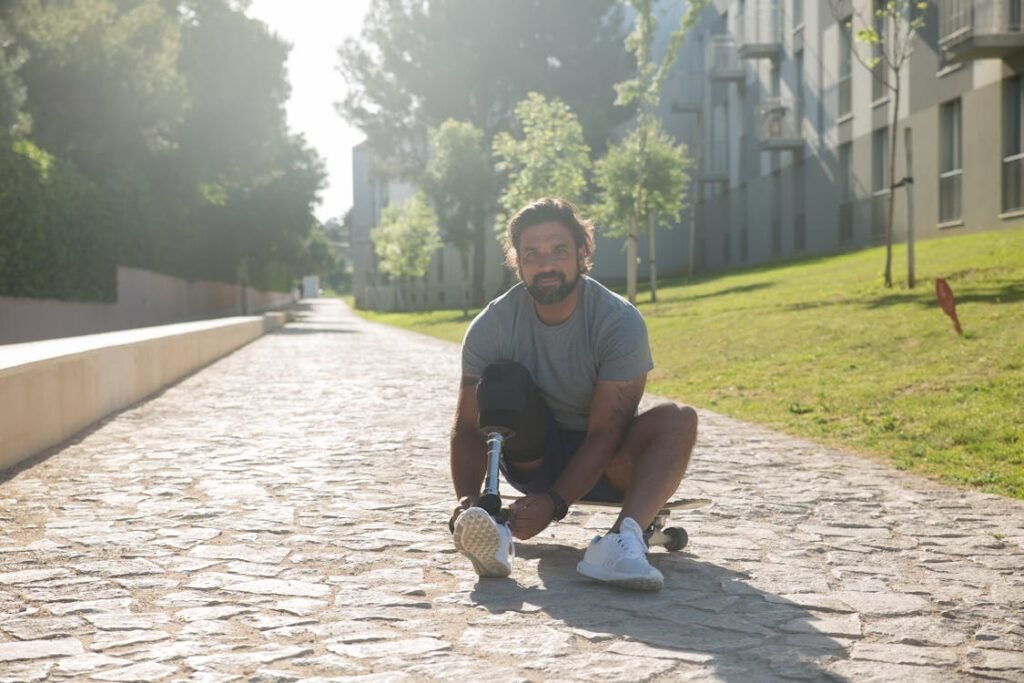
Turning Social Anxiety into Empowerment
Overcoming social anxiety after an amputation is not just about managing discomfort—it is about transforming fear into strength. Instead of seeing social interactions as something to avoid, amputees can use them as opportunities for personal growth and empowerment.
Taking control of the narrative, setting personal goals, and embracing new opportunities can make a significant difference in confidence and overall well-being.
Taking Small, Purposeful Steps
One of the most effective ways to reduce social anxiety is through gradual exposure. Instead of diving into overwhelming situations, amputees can start with small, manageable steps that build confidence over time.
For some, this might mean visiting a familiar café or store where they feel comfortable. For others, it might be engaging in short conversations with friends or neighbors. As these interactions become easier, confidence grows, and the fear of being in public starts to fade.
Repetition is key. The more often an amputee engages in social activities, the more natural they feel. Each successful interaction reinforces the idea that social situations are not as intimidating as they seem. Over time, what once felt impossible becomes second nature.
Redefining Strength and Independence
Social anxiety often makes amputees feel powerless, as though they are at the mercy of how others perceive them. But true confidence comes from within.
Redefining strength and independence in personal terms helps shift focus away from external opinions and toward self-empowerment.
Strength is not just about physical ability—it is about resilience, adaptability, and the courage to keep moving forward. Amputees who embrace their journey as a sign of their inner strength naturally project confidence, which influences how others see them.
Independence does not mean doing everything alone; it means making choices that align with personal values, comfort, and happiness.
At Robobionics, we have seen countless amputees go from feeling hesitant about social interactions to embracing life with confidence. This transformation happens not because the world changes, but because their mindset does.
When an amputee begins to see themselves as whole, capable, and deserving of full participation in life, their interactions with others follow that belief.
Embracing Public Speaking and Advocacy
For those who feel ready, sharing their experiences publicly can be a powerful way to overcome social anxiety. Some amputees choose to speak about their journey at community events, schools, or online platforms.
Turning personal struggles into stories of resilience not only helps build confidence but also educates and inspires others.
Advocacy can take many forms. It can be as simple as helping another amputee who is struggling with the same fears, raising awareness about accessibility, or working with organizations that support people with disabilities.
Taking an active role in shaping conversations about amputation allows individuals to feel in control of their narrative rather than being defined by it.
Conclusion
Overcoming social anxiety after an amputation is not about becoming fearless—it is about learning to navigate the world with courage, resilience, and self-acceptance. The journey may be challenging, but every step forward brings new opportunities for growth and empowerment.
With time, practice, and a supportive mindset, social interactions become less intimidating. The fear of judgment fades, replaced by confidence in one’s abilities and identity. Instead of worrying about how others perceive them, amputees can focus on living fully, engaging with the world, and embracing all the experiences life has to offer.
At Robobionics, we believe that recovery goes beyond physical mobility. True independence comes from feeling comfortable in your own skin and confident in your interactions with others. Whether through advanced prosthetic solutions, rehabilitation support, or community engagement, we are here to help amputees reclaim their lives.



